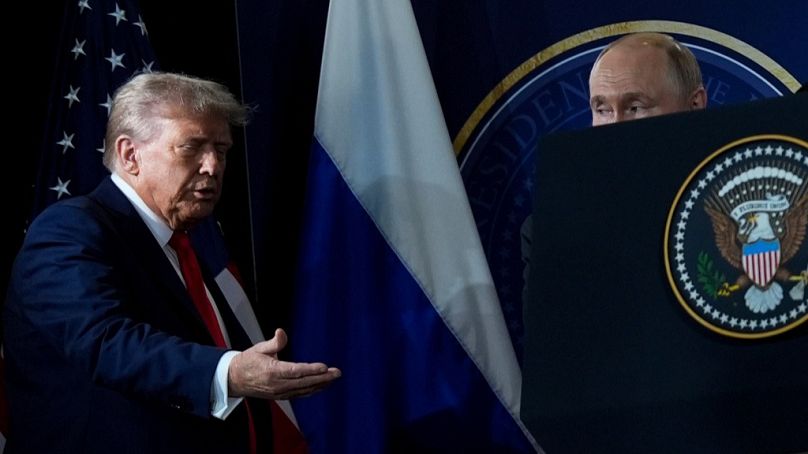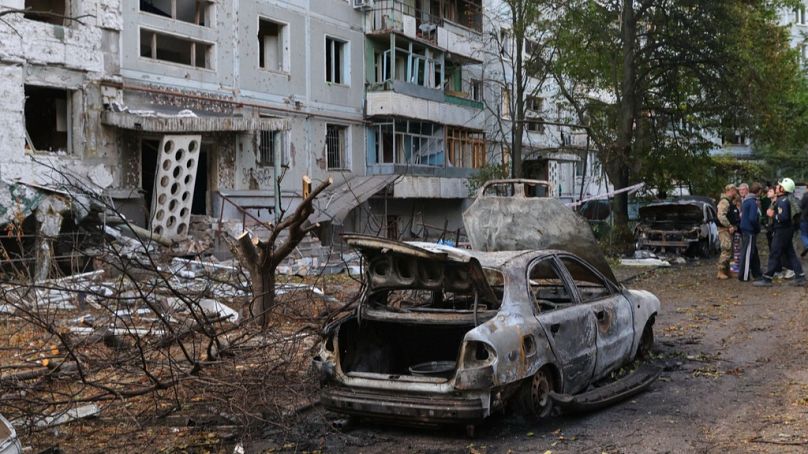David O'Sullivan, the EU's sanctions envoy, told Euronews he hopes the US will return to a policy of applying new sanctions against Russia.
US President Donald Trump's approach to ending Russia's war in Ukraine favours negotiation and engagement with Vladimir Putin over applying further sanctions, according to the EU's Sanctions Envoy David O'Sullivan.
 ADVERTISEMENT
ADVERTISEMENT
 ADVERTISEMENT
ADVERTISEMENT
However, O'Sullivan told Euronews "it's clear Putin is not responding", despite several attempts to bring Russia's president to the negotiating table.
In August in Alaska, Trump launched a major diplomatic push aimed at persuading Putin to agree to a ceasefire and a trilateral meeting with the US and Ukraine.
Neither goal materialised, and the US president is said to be deeply frustrated at Putin's apparent disingenuousness during the process.
"We wait to see exactly how President Trump responds to that, because he has shown irritation, even frustration with President Putin", the EU's sanctions envoy told Euronews.
Trump is now "talking about sending additional military aid to to Ukraine", O'Sullivan said of the ongoing request by Ukraine to purchase long-range missiles for use against Russia.
"We hope that Trump will draw from the experience he's had until now that Putin clearly doesn't want peace", said O'Sullivan.
Meanwhile, the EU is close to passing its 19th sanctions package against Russia, which among other things, for the first time, includes a future ban on Russian liquified natural gas (LNG).
The bloc is one of the biggest importers of Russian LNG, and the volume imported to the EU increased by 11% in 2024 compared to 2023, according to a report by Greenpeace.
**"**It's true that they [the US] have not been enforcing sanctions to the same extent in the first few months of this year because they wanted to put the effort on mediation and on brokering a peace deal", but "they still have substantial sanctions", O'Sullivan said.
"We in the meantime will continue to apply our sanctions in conjunction with the rest of the G-7, and we hope that the US will rejoin us very soon", he said.
Spotlight on Russian assets
Brussels is also discussing a proposal from the European Commission which would see Ukraine utilising around €140 billion of frozen Russian assets kept mainly in the Euroclear, a Belgian-based repository.
The legal workaround involves providing Ukraine with a loan based on the cash balances associated to the already immobilised Russian assets. Each EU member state would share the risk of the loan.
The European Commission says the assets themselves won't be touched, unless such a time arises when there the war ends, and Russia is invited to make reparations for damages, and payments for reconstruction.
Ukraine would only pay back the loan if Russia pays for the reconstruction.
The EU says the assets will be used as leverage to force Russia to make the payments for its responsibility in the levelling of many parts of Ukraine.
The European Commission is at pains to insist the proposal does not amount to confiscation of Russian assets, and that Moscow can claim them back at the end of the war, once it makes payments for reconstruction.
"It's not confiscation, because exactly as you say, Russia will get this back if they pay the reparations", O'Sullivan told Euronews.
"It's their choice. If they choose not to pay the money they owe for the destruction they have caused in Ukraine, then indeed Ukraine has some call on those assets in in in Europe as compensation", he said.
"We're not saying that we are going to appropriate these assets, what we are saying is we're holding them until we see how Russia is going to step up for its responsibilities and the undoubted debts that it owes for the reconstruction of Ukraine with the massive destruction, deliberate destruction of civilian infrastructure that we have seen," he said.












